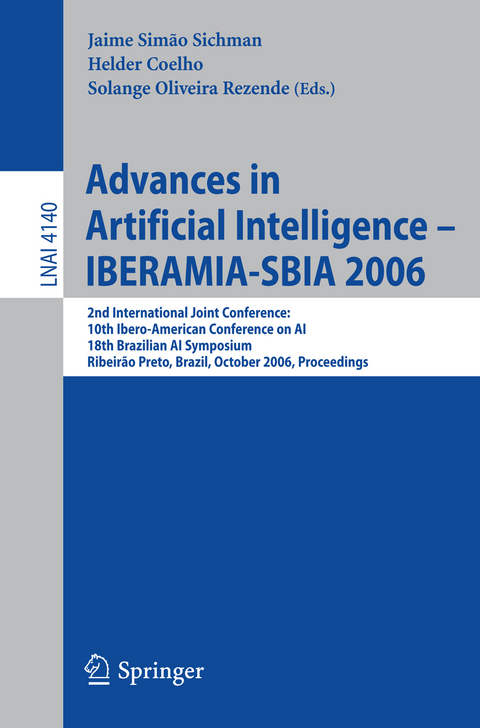
Advances in Artificial Intelligence - IBERAMIA-SBIA 2006
Springer Berlin (Verlag)
978-3-540-45462-5 (ISBN)
Invited Speakers.- Organizing Software Agents.- Learning, Logic, and Probability: A Unified View.- Reinventing Machine Learning with ROC Analysis.- Cocktail Party Processing.- AI in Education and Intelligent Tutoring Systems.- Diagnostic of Programs for Programming Learning Tools.- Intelligent Learning Objects: An Agent Approach to Create Reusable Intelligent Learning Environments with Learning Objects.- An Experimental Study of Effective Feedback Strategies for Intelligent Tutorial Systems for Foreign Language.- Autonomous Agents and Multiagent Systems.- Coordination with Collective and Individual Decisions.- Negotiator Agents for the Patrolling Task.- Running Agents in Mobile Devices.- A Multi Agent Based Simulator for Brazilian Wholesale Electricity Energy Market.- Using IDEF0 to Enhance Functional Analysis in OISE?+? Organizational Modeling.- Simulations Show That Shame Drives Social Cohesion.- SILENT AGENTS: From Observation to Tacit Communication.- Simulating Working Environments Through the Use of Personality-Based Agents.- GAPatrol: An Evolutionary Multiagent Approach for the Automatic Definition of Hotspots and Patrol Routes.- Learning by Knowledge Sharing in Autonomous Intelligent Systems.- Formal Analysis of a Probabilistic Knowledge Communication Framework.- Computer Vision and Pattern Recognition.- Color Image Segmentation Through Unsupervised Gaussian Mixture Models.- An Image Analysis Methodology Based on Deterministic Tourist Walks.- Feature Characterization in Iris Recognition with Stochastic Autoregressive Models.- Cryptographic Keys Generation Using FingerCodes.- Evolutionary Computation and Artificial Life.- Using Computational Intelligence and Parallelism to Solve an Industrial Design Problem.- Two-Phase GA-Based Model to Learn GeneralizedHyper-heuristics for the 2D-Cutting Stock Problem.- Mirrored Traveling Tournament Problem: An Evolutionary Approach.- Pattern Sequencing Problems by Clustering Search.- Hybrid Systems (Fuzzy, Genetic, Neural, Symbolic).- Development of a Hybrid Intelligent System for Electrical Load Forecasting.- Extending a Hybrid CBR-ANN Model by Modeling Predictive Attributes Using Fuzzy Sets.- Development of a Neural Sensor for On-Line Prediction of Coagulant Dosage in a Potable Water Treatment Plant in the Way of Its Diagnosis.- Multi-objective Memetic Algorithm Applied to the Automated Synthesis of Analog Circuits.- A Hybrid Learning Strategy for Discovery of Policies of Action.- Knowledge Acquisition and Machine Learning.- A Fractal Dimension Based Filter Algorithm to Select Features for Supervised Learning.- Comparing Meta-learning Algorithms.- A New Linear Dimensionality Reduction Technique Based on Chernoff Distance.- A Machine Learning Approach to the Identification of Appositives.- Parameterized Imprecise Classification: Elicitation and Assessment.- Evolutionary Training of SVM for Multiple Category Classification Problems with Self-adaptive Parameters.- Time-Space Ensemble Strategies for Automatic Music Genre Classification.- Predictive and Descriptive Approaches to Learning Game Rules from Vision Data.- Knowledge Discovery and Data Mining.- Mining Intonation Corpora Using Knowledge Driven Sequential Clustering.- Using Common Sense to Recognize Cultural Differences.- Detection of Repetitive Patterns in Action Sequences with Noise in Programming by Demonstration.- Knowledge Engineering, Ontologies and Case Based Reasoning.- Supporting Ontology-Based Semantic Matching of Web Services in MoviLog.- Learning Similarity Metrics from Case Solution Similarity.- Knowledge Representation and Reasoning.- Epistemic Actions and Ontic Actions: A Unified Logical Framework.- Strings and Holes: An Exercise on Spatial Reasoning.- A Causal Perspective to Qualitative Spatial Reasoning in the Situation Calculus.- PFORTE: Revising Probabilistic FOL Theories.- Rule Schemata for Game Artificial Intelligence.- Neutral Language Processing.- Selecting a Feature Set to Summarize Texts in Brazilian Portuguese.- Word Sense Disambiguation Based on Word Sense Clustering.- Comparing Two Markov Methods for Part-of-Speech Tagging of Portuguese.- Shallow Parsing Based on Comma Values.- Planning and Scheduling.- Unifying Nondeterministic and Probabilistic Planning Through Imprecise Markov Decision Processes.- Achieving Conditional Plans Through the Use of Classical Planning Algorithms.- Assessing the Value of Future and Present Options in Real-Time Planning.- Reading PDDL, Writing an Object-Oriented Model.- Robotics.- A Reactive Lazy PRM Approach for Nonholonomic Motion Planning.- Negative Information in Cooperative Multirobot Localization.- Gait Control Generation for Physically Based Simulated Robots Using Genetic Algorithms.- Does Complex Learning Require Complex Connectivity?.- Theoretical and Logical Methods.- The Predicate-Minimizing Logic MIN.- Strong Negation in Well-Founded and Partial Stable Semantics for Logic Programs.- MAT Logic: A Temporal×Modal Logic with Non-deterministic Operators to Deal with Interactive Systems in Communication Technologies.- Uncertainty.- Probabilistic Logic with Strong Independence.- Bayesian Model Combination and Its Application to Cervical Cancer Detection.
| Erscheint lt. Verlag | 6.10.2006 |
|---|---|
| Reihe/Serie | Lecture Notes in Artificial Intelligence | Lecture Notes in Computer Science |
| Zusatzinfo | XXIII, 635 p. |
| Verlagsort | Berlin |
| Sprache | englisch |
| Maße | 155 x 235 mm |
| Gewicht | 916 g |
| Themenwelt | Informatik ► Theorie / Studium ► Algorithmen |
| Informatik ► Theorie / Studium ► Künstliche Intelligenz / Robotik | |
| Schlagworte | AI logics • AI Planning • Algorithm analysis and problem complexity • Algorithmic Learning • Artificial Intelligence • Artificial Life • autonom • Autonomous Agents • Cognition • Cognitive Technologies • Computational Intelligence • computer vision • Data Mining • distributed AI • Evolution • evolutionary computation • Evolutionary Computing • Genetic algorithms • Hybrid Systems • Intelligent Agents • Knowledge Discovery • Knowledge Engineering • Knowledge Processing • Knowledge Representation • Logic Programming • machine learning • Multi-agent Systems • Natural Language Processing • neural computing • Neurolinguistisches Programmieren (NLP) • NLP • Ontology • Robotics • Uncertainty |
| ISBN-10 | 3-540-45462-4 / 3540454624 |
| ISBN-13 | 978-3-540-45462-5 / 9783540454625 |
| Zustand | Neuware |
| Haben Sie eine Frage zum Produkt? |
aus dem Bereich


